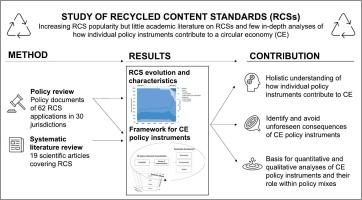循环经济政策工具的概念化:再生成分标准案例
IF 10.9
1区 环境科学与生态学
Q1 ENVIRONMENTAL STUDIES
引用次数: 0
摘要
回收成分标准(RCSs)是一种日益流行的监管政策工具,要求在新产品中使用回收材料,从而实现材料闭环。公共政策可以促进循环经济(CE)的实施,但诸如回收成分标准等单个政策工具与循环经济之间的关系还需要更多的研究。在这项研究中,我们回顾了 30 个司法管辖区的 62 项循环经济政策和 19 篇有关循环经济的科学文章。我们的分析表明,自 2018 年以来,全球多个司法管辖区掀起了新一轮日益严格的 RCS 浪潮,主要针对包装塑料并瞄准 CE 目标。基于我们的 RCS 研究,我们为 CE 政策工具制定了一个概念框架,并得出了三个主要结果。首先,CE 政策工具具有关键特征,包括可行性、设计和管理。第二,它们针对可持续发展的经济、环境和社会支柱。第三,它们在多个抽象层面具有潜在的系统效应。我们的框架可供研究人员、政策制定者和行业从业者使用,以了解政策工具如何有助于促进可持续消费,但又可能产生不可预见的后果。因此,我们的研究可以指导有效的行政首长协调会决策,并建议调查全面的行政首长协调会政策组合。本文章由计算机程序翻译,如有差异,请以英文原文为准。

Conceptualizing circular economy policy instruments: The case of recycled content standards
Recycled content standards (RCSs) are an increasingly popular regulatory policy instrument requiring recycled materials in new products, thus aiming to close material loops. Public policy can boost the implementation of a circular economy (CE), but the relationship between individual policy instruments such as RCSs and CE needs more research. In this study, we reviewed 62 RCS policies in 30 jurisdictions and 19 scientific articles on RCSs. Our analysis has shown a new wave of increasingly stringent RCSs in multiple jurisdictions worldwide since 2018, primarily for packaging plastics and targeting CE goals. Based on our RCS study, we developed a conceptual framework for CE policy instruments with three main results. First, CE policy instruments have crucial characteristics, including feasibility, design, and administration. Second, they target the economic, environmental, and social pillars of sustainable development. Third, they have potential systemic effects at multiple abstraction levels. Our framework can be used by researchers, policymakers, and industry practitioners to understand how policy instruments contribute to CE but may have unforeseen consequences. Thus, our study guides effective CE policymaking and recommends investigating comprehensive CE policy mixes.
求助全文
通过发布文献求助,成功后即可免费获取论文全文。
去求助
来源期刊

Sustainable Production and Consumption
Environmental Science-Environmental Engineering
CiteScore
17.40
自引率
7.40%
发文量
389
审稿时长
13 days
期刊介绍:
Sustainable production and consumption refers to the production and utilization of goods and services in a way that benefits society, is economically viable, and has minimal environmental impact throughout its entire lifespan. Our journal is dedicated to publishing top-notch interdisciplinary research and practical studies in this emerging field. We take a distinctive approach by examining the interplay between technology, consumption patterns, and policy to identify sustainable solutions for both production and consumption systems.
 求助内容:
求助内容: 应助结果提醒方式:
应助结果提醒方式:


